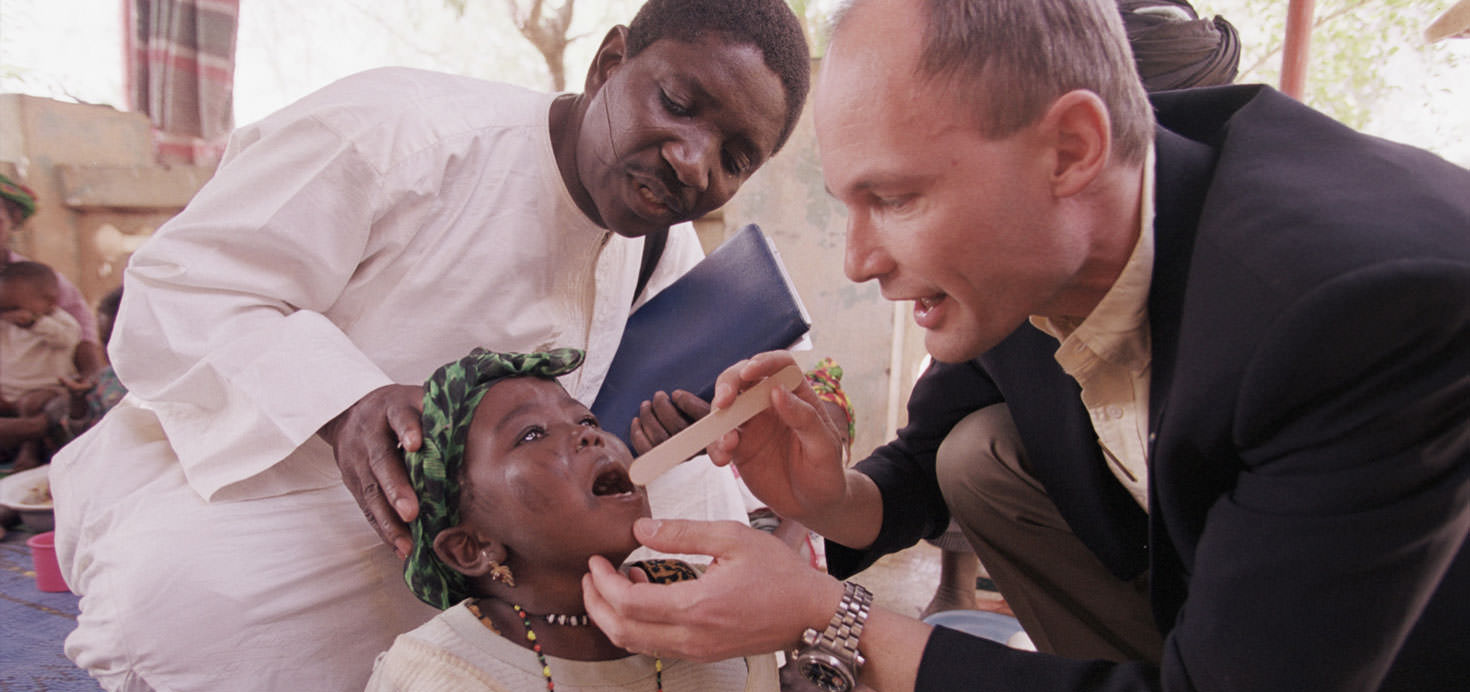
« Inequalities are not only morally unacceptable; they are also dangerous for the functioning of our world. »
« Humanitarian work should make us question the imbalance which has evolved in our world, split between a society of overconsumption and populations that are starving, between ultra-sophisticated technologies and total destitution. Humanity will not be able to advance very far if it leaves half of its population behind. To ring the alarm bell is not a matter of naive solidarity, but of everybody's security. »
Winds of Hope and the fight against noma
Bertrand is committed to eradicating this poverty-related disease by funding prevention, early detection, and primary care programs. He also identifies synergies in the work of the No-Noma International Federation, which he created to bring together associations that are active in combating this disease. In addition to the concrete actions carried out on the ground, Bertrand uses his public speaking and political meetings to mobilize international action.
« When we first hear its name, we do not know what it is. When we hear it described, we cannot believe what we hear. And when we see it with our own eyes, we will never be the same again. Noma is a disease that not only leaves indelible scars on the faces of its tiny victims but also on the minds of those who witness it. The shame of not knowing about it earlier, the horror that such a thing is possible in the 21st century, the incomprehension that so few humanitarian organizations are tackling it! Because of its non-communicable nature, noma is not a priority for anyone. Its direct link with malnutrition and poor hygiene, however, makes it a symbol - of poverty. It must be eradicated. »
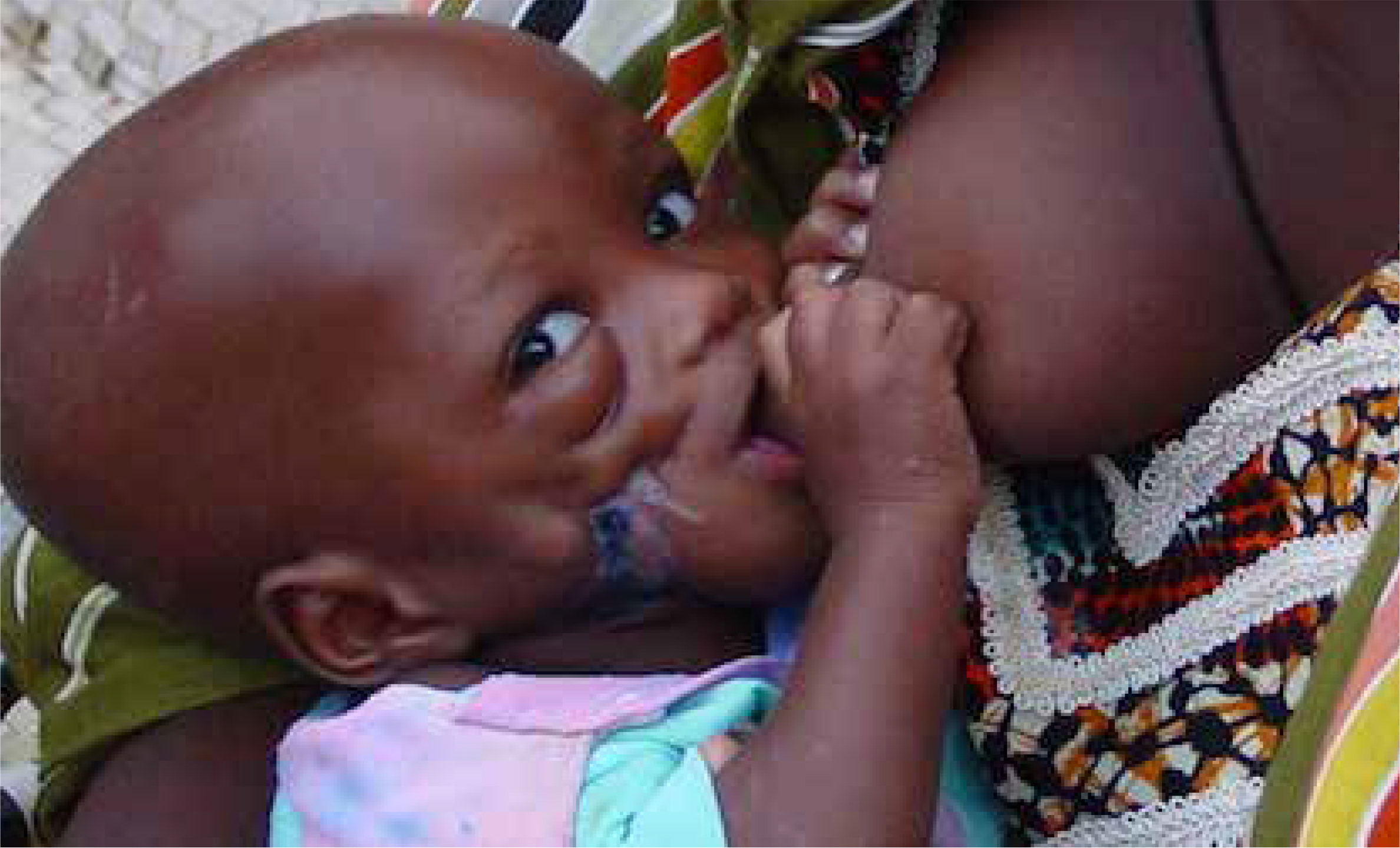
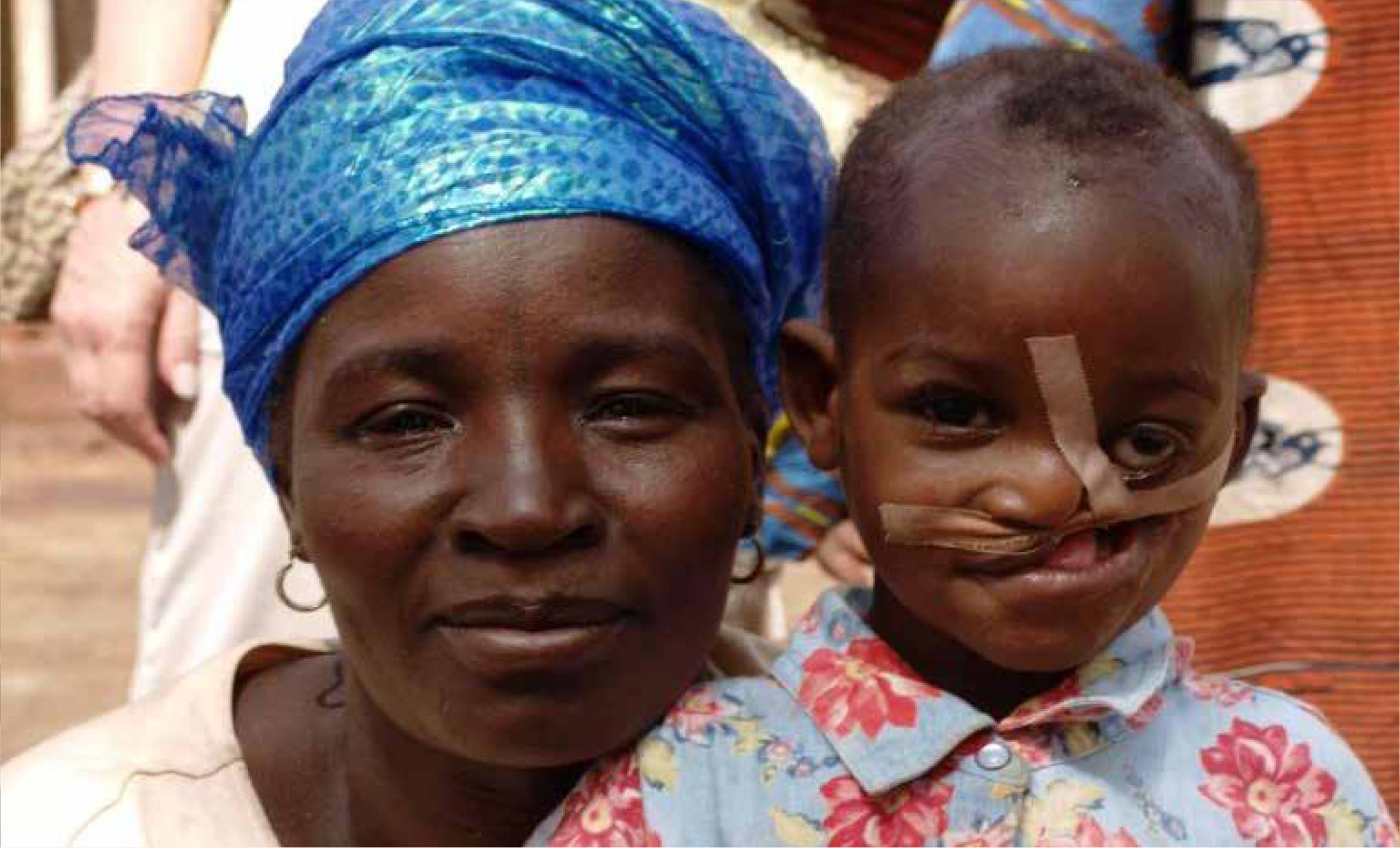
Noma, a symbol of profound poverty, a reality that affects thousands of children
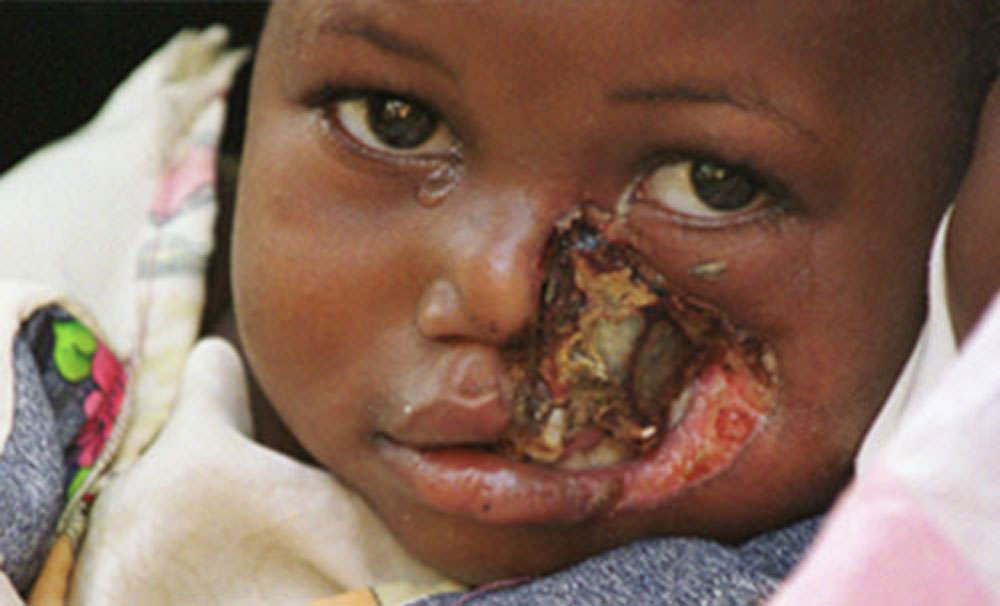
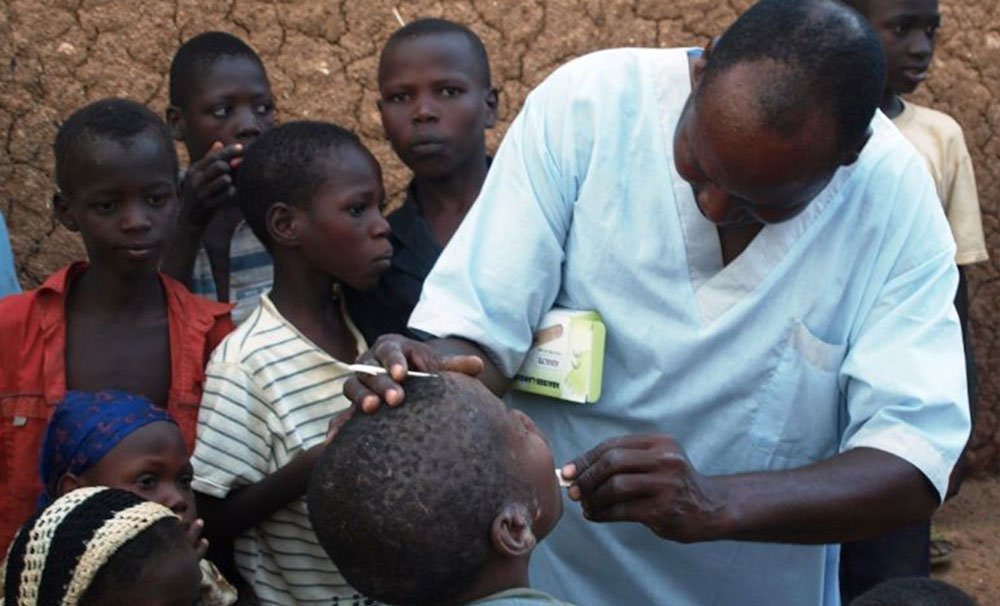
Noma, a symbol of profound poverty
Noma, from the Greek "nomein" which means to devour, is a virulent necrosis which develops in the mouth and destroys both the soft and the bony tissues of the face. Noma flourishes when lack of hygiene and malnutrition weaken the immune system, and is found in conditions of extreme poverty. Its victims are practically all children between 2 and 6 years old. Left untreated, noma is fatal in 80% of cases and leaves survivors in an excruciating state of mutilation. Although noma arises from malnutrition, the reason it develops is the ignorance of all those around when it appears. Early treatment with a few doses of antibiotics when the very first symptoms appear would suffice to stop the progression of gangrene. After this stage, all that can be done is costly and painful reconstructive surgery to make these children look human again ...
A reality that affects thousands of children
Every year, amid general indifference, thousands of young children living in the poorest regions pay an unacceptable penalty for malnutrition, poor hygiene and ignorance. The infection starts with gingivitis, turns into ulcerative necrosis, then, unnoticed, develops into edema of the cheek, before becoming irreversible. All this happens within days because the children’s natural defenses are weakened by malnutrition. Each year, thousands of children aged two to six in the poorest areas will never again be able to eat and breathe normally. Very often, they will be rejected by their community, which views the illness as a curse. And yet, a few francs worth of antibiotics given in time would have prevented this development and its terrible consequences.
Launching a campaign to eradicate this scourge
Bertrand commits the Winds of Hope Foundation to 3 axes of action
Prevention
Combating noma before it appears, or at the first signs of the disease, through training programs for community health workers and awareness-raising in village; Bertrand's aim Is to develop simple programs with a strong multiplier effect that facilitate the spread of preventive information, early detection, and primary health care.
Before the security situation in sub-Saharan countries deteriorated, the Winds of Hope Foundation focused Its main efforts on financing national prevention and early detection programs in Niger, Burkina Faso, Mali, Benin, Togo and Senegal, where partnerships were implemented with the respective health ministries and the WHO's African headquarters. Nearly 20,000 healthcare workers, nurses, midwives and traditional healers in these areas have been trained to recognize and treat noma as soon as the first symptoms emerge, so as to stamp out the disease.
Raising Awareness
Bertrand Piccard exploits his fame to mobilize the international community, public opinion and political authorities, explaining all about this intolerable disease and seeking to influence and motivate politicians to adopt urgent counter-measures.
This aspect of the work, carried out through the Winds of Hope Foundation, consists of providing information, and making the case for the eradication of noma, via public-speaking engagements and meetings with governmental authorities. In March 2012, at the initiative of Winds of Hope and Mr. Jean Ziegler, the UN Human Rights Council adopted a text on the relationship between severe malnutrition, childhood illnesses - in particular noma - and the human rights of the child. This constituted the first official international recognition of noma as an absolute marker of extreme poverty.
Coordination
In 2003, at Bertrand’s suggestion, Winds of Hope created the International NoNoma Federation, which brings together most of the organizations active in the fight against noma, from prevention to reintegration of victims, and including surgical interventions. This search for synergies, via scientific round tables and joint campaigns in the field, has proved to be vitally important when deploying the forces needed to combat this scourge.
In 2008, Winds of Hope collaborated with the NoNoma Federation to organize Noma Day. This was a day dedicated to science and information, set up on the side-lines of the WHO General Assembly, and with their active collaboration. The initiative, directed by Michèle Piccard, was a great success and helped to bring this disease - the "face-of-poverty"- out of the shadows. It raised nearly 1 million Swiss Francs, which was allocated entirely to campaigns of prevention.
A promise made after the around-the-world balloon trip
On their return from flying around the world in a balloon, Bertrand Piccard, Brian Jones and Breitling promised to dedicate their victory to the children of the world and to use their fame to fight against forgotten and neglected suffering. The cause of noma quickly impressed itself on them because of its symbolic character: it stands for the most extreme poverty.
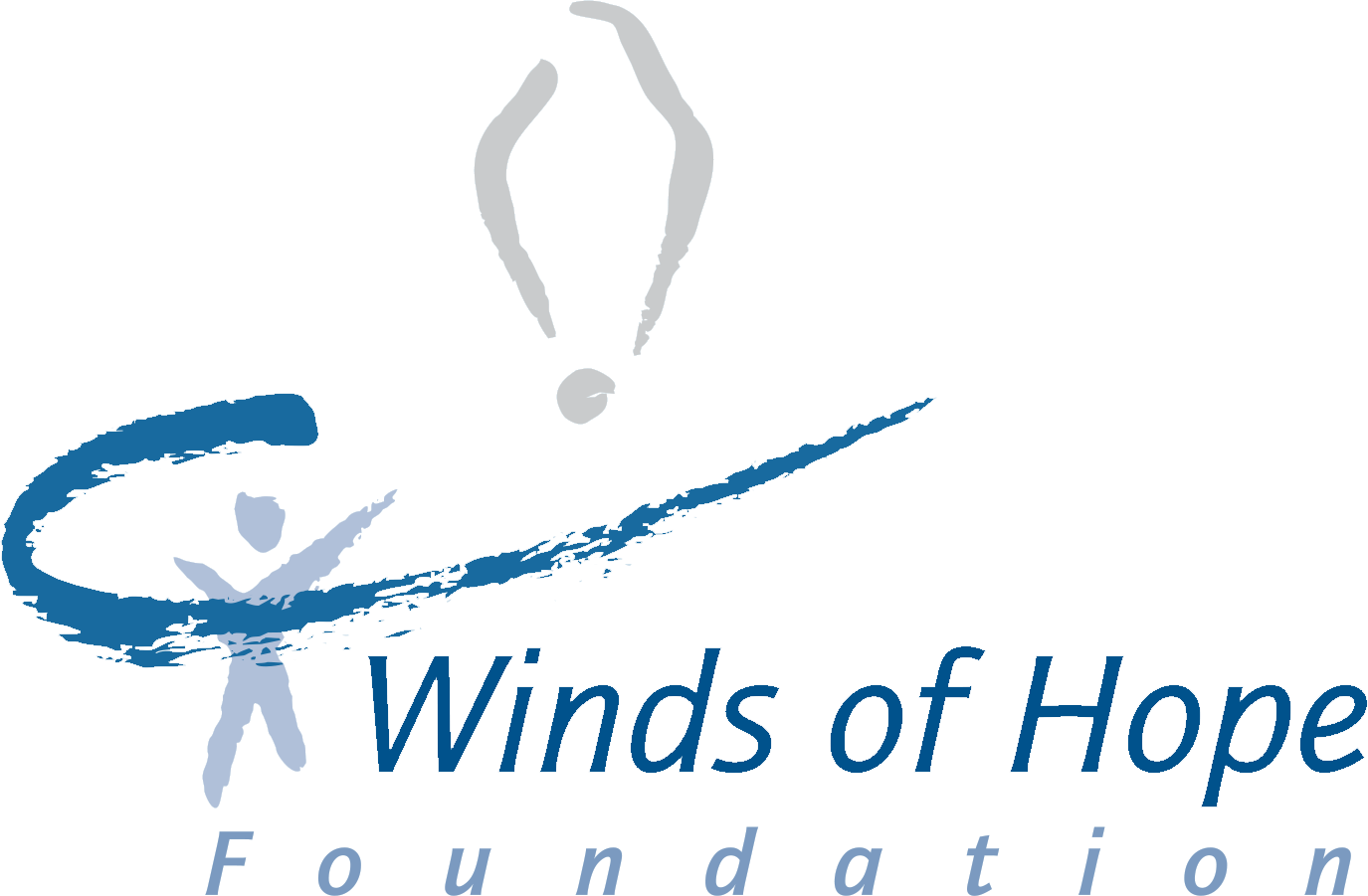
Created on 9-9-1999, the Winds of Hope Foundation is recognized as being of public utility and placed under the high supervisory authority of the Swiss Confederation. Its original capital came from the Budweiser Prize won by the around-the- world balloon team, and a donation from Breitling. It is funded by donations from private individuals and business, which are tax deductible.
Donations online on the website of Winds of Hope : www.windsofhope.org
Their faces mutilated, afflicted by a crushing disease considered as a curse; all around them only fear, gawking, rejection.

United Nations Population Ambassador
A few months after his around-the-world balloon trip, Bertrand agreed to support the projects of the United Nations Population Fund (UNFPA). Together with such personalities as Carl Lewis, Ronaldo, Michael Schumacher, David Beckham and Angelina Jolie he became a United Nations Goodwill Ambassador for field campaigns with local authorities, the general population and the media.
Three mandates between 2000 and 2012
From the poorest villages to government ministries, Bertrand committed to programs fighting poverty by educating women and integrating them into professional life. The campaigns he participated in were mainly in India, but he also urged action on several governments in South America, as well as conducting information and fundraising campaigns in Europe.
Opening speech of the United Nations Social Summit 2000
« Ladies and Gentlemen from all around the world,
Please let me first tell you the pleasure I take in having you see my country, Switzerland, and the international City of Geneva expressing their tradition of humanitarian, social, diplomatic and peace activities. I am pleased to welcome you all to this potentially very important social summit.
Going around the world in a balloon gives a very special vision of the planet. For Brian Jones and me, it was like taking the world in our arms for three weeks. And it is now upsetting for us to hear people saying: « I don’t care about this problem or this war; it is on the other side of the world. »
Speaking about globalization now requires us to globalize the actions against unacceptable sufferings in the world. But for that, words are not enough.
When you fly around the world in a balloon, you are pushed by the wind, almost prisoner of the stream. If you want to change your trajectory, you have to change your altitude in order to find another layer of wind which has another direction. In that way, ballooning is a metaphor for life. Human beings are often prisoner of their problems, their habits or their search for power and money.
If we want to change something in the direction of life, we just have to change our altitude and in this case, our attitude. We have to go from words to actions.
Words are not enough because we usually forget what there is behind words such as suffering, death, AIDS, poverty, torture and so on.
Communication and information go so fast, that after seeing the worst pictures from a war or a starvation, we just change the channel on our TV or turn the page of our newspaper... and forget all about it.
But suffering is not temporary: it is permanent. This implies that day and night, millions of men, women and children cry, feel terrible pain or distress, or do horrible compromises to obtain some food and water to feed the ones they love. And far too often, they don’t even know who in their family will still be alive when they come back home.
But what is death? It is not only a body lying on the ground. It is far more than a little move of a finger on the trigger of a gun. The death of a person means the suffering for a whole family for the next 30 or 40 years. And even when a war stops, many crippled survivors keep on living with long term physical and psychical scars that will never allow them to have a normal life.
Yes, suffering is not temporary, it is permanent. But we forget that because we have not learned to live at the right altitude, we have not developed the ability to put ourselves in the shoes of the people who suffer.
The tears of the suffering children and adults should prevent us from sleeping.
Ladies and Gentlemen, during the last millennium, humanity was too insensitive toward suffering.
Too many generals, presidents and other heads of state got their glory out of conquering and entered history thanks to their power or sometime their personal gain.
But we hope times have changed and sensitivity has changed; and I give as a proof of this the fact that we are all here this week for a social summit.
From now on, heads of state will enter in the history books if they have humanity, if they understand the needs of their people and only if they are able to put themselves in the shoes of those who suffer.
We are now in a situation where it is not acceptable to leave 1/2 of humankind without basic rights: not only morally, but also for the safety of the world. An imbalance always create great friction even revolution; not only morally, but also rationally. By leaving 1/2 of the world out of the market, companies are losing billions of potential sales.
And 1/2 of the world doesn’t have access to the goods and services they need. This is not only cruel and unsafe, it is stupid. It is in contradiction with all the economical rules!
But don’t let me be misunderstood, solidarity doesn’t mean sharing the wealth of rich with the poor, because everyone will then become poor. Solidarity means sharing potentials, helping development, undertaking political actions to fight against starvation, developing educational and health programs, respecting the value of life and human beings on this planet.
But respect is not simply a word. When you overfly the world, it becomes obvious that life on this planet is a miracle, and each single person carries a little bit of this miracle. In that sense, respect is the recognition of this magical spark of life within each single person.
Respect also means to accept all the differences between people.
During our historical flight, we were amazed by all the contrasts of colors, of shapes. The planet would not be so wonderful without all those differences. It’s actually the same for human beings.
They are all different, in colors, in religion, in politics, in opinions, and it is a way to destroy the world when someone tries to eliminate or torture any of them because of his or her differences.
The first heads of states to understand this and diligently promote human rights and social development will enter the history books. By caring about their people’s life and evolution, they will become leaders of a new kind, leaders of the new millennium. They will renounce to a little bit of short term glory to gain permanent recognition.
Ladies and Gentlemen form all around the world, life is unacceptably hard for 1/2 of the world’s population. This week’s social summit needs the right altitude to find the right direction. It needs actions, decisions, courage... and not simply words. The world now invites you all to become the leaders of the new millennium, the leaders who will enter into history books for their courage, their value and their respect for human life.
May the wind hasten your success as it did for our balloon around the world.
Good Lucky! »
Bertrand Piccard
Opening speech of the United Nations Social Summit 2000
Solidarity means above all sharing our potential, a common vision for development



